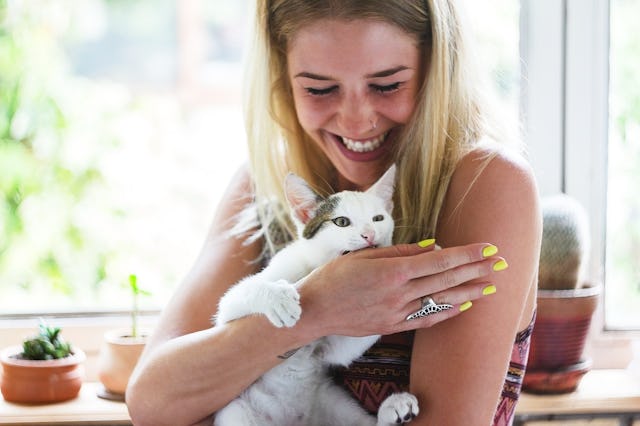Why Does My Cat Bite Me, AKA The Literal Hand That Feeds Them? What Gives?
A veterinarian unpacks this classic cat behavior.

It's a scenario that has played out more times than I can count: One minute, my cat, Olive, is playfully rubbing against me while I'm watching Dawson's Creek; the next, she's biting my hand! Seriously, what gives? Why does my cat bite me? And more specifically, why does my cat bite me gently out of nowhere? Does she love me or not?
If you're a cat parent, you're probably familiar with the finickiness of your feline friend. Cats and kittens bite for different reasons, and while we know they don't intend to hurt us, some bites can be painful and cause injury — which is why it's important to teach your cat not to bite you or other people.
While gentle biting can be a normal form of communication, Michelle Dulake, DVM, co-founder and CEO of Fera Pets, says it's "not ideal if this behavior becomes frequent or aggressive. Signs that this isn't good for the animal include negative changes in behavior, excessive aggression, or signs of pain."
Here's everything you should know about why your cat bites you, and when to be concerned about their biting behavior.
What are some common reasons cats bite their people?
Not all cats bite. Dulake says their tendency to bite can vary depending on their temperament, how they were socialized as kittens, as well as their environment. "Some cats are naturally more gentle, while others might be more prone to biting," she says.
According to Dulake, there are a number of reasons why your cat might bite you. They include:
- Playfulness: Cats often use their mouths to explore and play, especially if they were not taught to play gently as kittens.
- Overstimulation: Sometimes, cats can get overstimulated from too much petting, leading to petting-induced aggression.
- Communication: Gentle bites can be a way for cats to communicate that they've had enough attention or even to express affection.
- Hunting instinct: Cats have a natural hunting instinct, and biting can be a form of simulated hunting behavior.
- Stress or anxiety: Biting can be a response to stress, anxiety, or fear in their environment.
Are there specific things that might trigger your cat?
Now that you know why your cat might bite you, Dulake outlines specific things or experiences that might trigger your kitty to use their teeth on you. These might include:
- Excessive/prolonged petting or touching of sensitive areas
- Sudden movements or loud noises
- Play that mimics hunting behaviors
- Feeling threatened or cornered
- Pain or discomfort
Since no one wants to experience their cat biting them — no matter how gentle their little bites might be — Dulake says there are some things you can do to help curb your cat from sinking their chompers into you.
Observe Body Language
Learn to recognize when your cat is getting overstimulated or annoyed so that you can stop petting them before they bite.
Redirect Play
Use toys instead of hands to play with your cat to avoid reinforcing biting behavior.
Positive Reinforcement
Reward your cat for gentle behavior and provide treats or affection when they are calm.
Consistent Responses
If your cat bites, gently draw your attention away from them to show that biting leads to the end of playtime or petting.
What are signs that you might have to go to the vet?
Sometimes, your cat's urge to bite is a lot more serious than them gently telling you that they want to be left alone. Dulake says you should seek veterinary help if your cat's biting is accompanied by sudden changes in behavior that are out of character for your cat; signs of pain or discomfort, such as limping or vocalizing; unexplained aggression; or symptoms of illness, such as lethargy, vomiting, loss of appetite, or weight loss.
Severe cat aggression that is unexplained — or aggression accompanied by signs of distress — could indicate an underlying medical condition that requires immediate treatment. Always better to be safe than sorry where your BFF (best feline friend) is concerned.